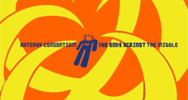 |
 |
|
|
|
| |||
 Matt Schickele
Matt SchickeleCities Filled with Lights [Feldspar] Rating: 7.8 The next time you feel like impressing a four-year-old at dinner, try this: shake out a pile of salt onto the table, then balance the shaker on its edge on the pile. Then, right before the little bugger's eyes, blow the salt away. "Dude, what the fuck?" he'll say, indelibly impressed by your Mister Wizard-like ability to leave the shaker standing with no visible means of support. Or maybe not; at least he'll stop shoving peas up his nose for a few seconds. Matt Schickele would be a hit with the kids. Cities Filled with Lights is filled with moments where Schickele kicks the legs out from under his songs, only to stand back and watch them keep right on walking. The album's first track, "Above the Air," establishes a cozy enough atmosphere for itself with layers of gauzy, chiming guitar. Every so often, however, Schickele suddenly cuts out the fluff, leaving only an off-key bass note and his voice to carry the song through the vacuum to the next island of comfort. It's these little interruptions in the flow that turn what would have a been just a pretty good song, and a pretty good album, into something unique. Schickele, who had a stint with Ida's similarly named (coincidence?) Karla Schickele in the band Beekeeper, is working mostly alone here. Even though three of the songs consist of just Schickele and his guitar, this isn't typical singer/songwriter fare; melody and lyricism often share the stage with clattering pianos and skittering slashes of noise. It's never overdone, however. Schickele shares with his sensitive strum-siblings a certain restraint, keeping each track attractively minimal and each part clear and audible within the whole. But more than that, Schickele has an uncanny sense for arranging these parts in unexpected yet satisfying ways. "Maybe," for instance, begins in a complex dual-guitar chug that gives way to a series of icily staccato piano chords, which Schickele then complements with gentler snare drum accents. "Enemies like Enemies" sets an anxious, oscillating effect loose inside the bounds of a melancholy, elliptical tune. And then there are those gravity-defying moments that Schickele pulls off so well: a recurring snaky guitar riff repeatedly halts the quasi-ballad "Steal the Road" dead in its tracks, while "Split the Clouds" flashes from a mellow swing into Schickele's hoarse, impassioned keen without warning. Even the sparer tunes find an enormous amount of space through which to twist and turn. "Little Machines," "Treat," and the title track all sound like folk songs from some previously unknown country. Schickele's voice (an earthy, Smog-ish croon) carries the simple melodies with an uncanny sadness while his guitar traces oddly graceful jags between the words. Here, as elsewhere, the lyrics deal mostly with the conflict between inertia and escapism, encapsulated in the weirdly evocative chorus from "Above the Air": "Outer lighted, fashion coded, drift alone and let it all out/ And the city's awful, let's get our time in satellites of gold/ Can't begin to slow." There's a certain laziness that gets the better of these songs once in a while, as Schickele vamps on a certain progression for a bit too long, indulges in a pointless instrumental, idles on an intro for too long before starting the song, or keeps a song going after it should have faded out. However, it's hard to judge these songs by normal criteria. Schickele's approach is distinctly different, drawing from weird parallel universes of sound while still keeping one foot planted on Earth. It's a balancing act that's hard to fully comprehend, and even harder to ignore.
|
|||

